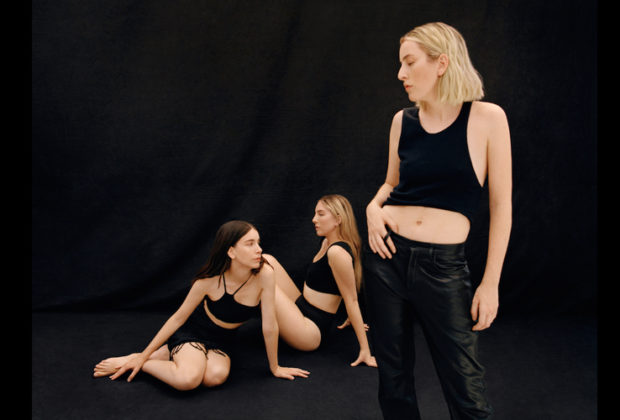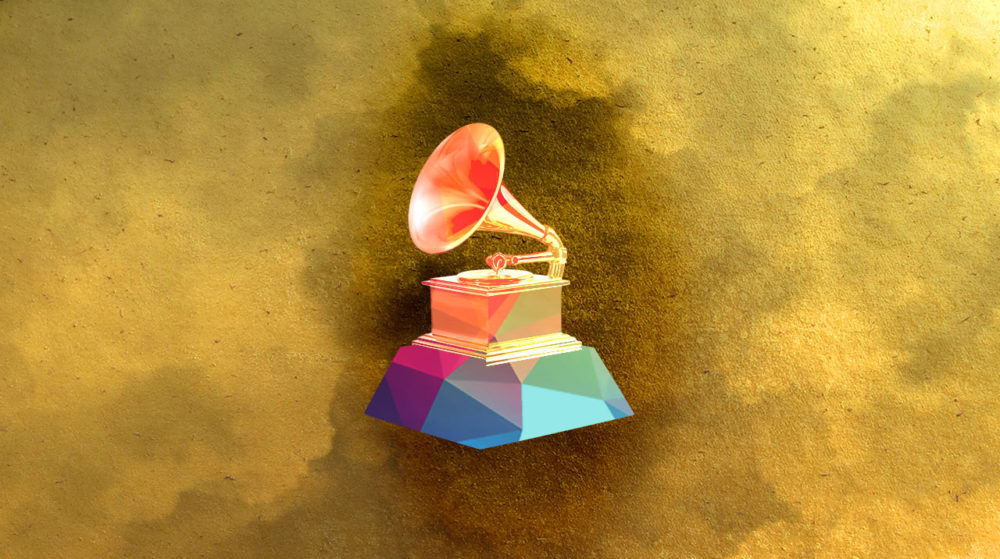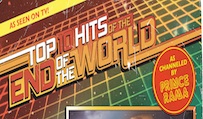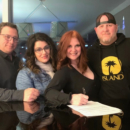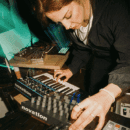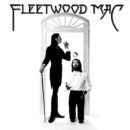When we last featured HAIM (sisters Este, Danielle and Alana) on our March 2014 cover, they were fresh off their debut, Days Are Gone, and a breakout performance on SNL and their name was getting dropped by youngsters, Coachella hipsters (where they played twice) and iconic rockers alike. The trio were nominated for a Best New Artist Grammy, sharing the stage and receiving accolades from Stevie Nicks and Dave Grohl, and getting pop radio play on KIIS FM. Shortly after, they became besties with Taylor Swift and were invited to open on her 1989 Tour. Actually, as we put this issue to bed, Swift just released her latest album, Evermore, with Haim on a song called “No Body No Crime,” a naughty murder mystery that opens with the line, “Este’s a friend of mine.”
Haim’s second album, Something to Tell You, was by no means a sophomore slump. It was a charting success, the songs were catchy and superbly crafted, but while it moved the ball forward from their debut, it didn’t move their needle. Personally, I think it warms up with repeated listening, but one critic called it hermetically sealed, and fan Tim White complained in the comment section of AllMusicGuide.com that it was “way too slick.” He optimistically added, “Hopefully a maverick streak can prevail on album 3.”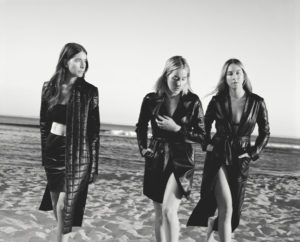
Well, Tim, your wish came true! Women in Music Part III (Columbia Records) is by far Haim’s best record. No surprise, it has made many year-end Top-10 lists. It’s the band’s Exile on Main St. (or Exile in Guyville to turn the phrase in a girl power direction a la Liz Phair). The debut may have formerly introduced their sound, but this baby is their wild child, it can’t be stifled and you can’t put a bow on it. There’s an impressive, relaxed confidence, moments of dark, deep introspection and others with thrilling reckless abandonment. The lead single, “Summer Girl,” is as if Lou Reed (who they co-credit for the inspiration) was an Angeleno with Annie Lennox guesting on a Sheryl Crow record. “Los Angeles” is classic Trojan Records but straight outta Silver Lake.
And then there’s “Man from the Magazine,” an ode to Joni Mitchell, which reminds you that WIMPIII may have a tongue-in-cheek acronym (like “wimpy”), but it tackles serious issues like the misogyny they constantly battle in their workplace, which happens to be showbiz. Case in point, that well publicized time in 2018 when they fired their booking agent for paying them 10 times less than a male artist they shared a festival bill with. This album is sweet revenge for all of it, the only downside is (for some reason) rock radio still has an unexplainable blind spot for Haim. Is it because they are too genre-fluid or because they are women?
We caught up with Danielle and Este on the phone, and later with their youngest sister Alana “Baby Haim” who wrapped her role on Paul Thomas Anderson’s upcoming San Fernando Valley opus. Their relationship with PTA as collaborator and muse is a story in itself; Godard and the Stones could only wish to have such a prolific relationship; he’s made a documentary on the band, directed almost all their music videos and shot their latest album cover as well. He’s the Nicolas Cage to their ultimate Valley Girls, a match made in heaven.
Haim may not be getting their deserved rock radio play, but they get the last laugh, because as we celebrate the GRAMMY edition of the magazine (and if you are one of the elites to be reading this magazine in a $10,000 swag bag, you’ll by now know) our Valley Girls, our Cover girls, have been nominated for the 2021 GRAMMY’s for Best Album and Best Rock Performance.
Music Connection: Congratulations on the Grammy nomination, and good luck. How does it feel so far?
Este: It feels great! Very unexpected.
MC: It’s well deserved. On this third record you’ve outdone yourself. There’s a more relaxed confidence, do you agree?
Danielle: Definitely. With our first and second albums we were kind of on the same wavelength. With our first album, we had from 2007 to 2012 just writing songs, trying them out at local venues, opening up for friends, just really grinding them out and coming upon what we thought were our best 11 songs at that time. We didn’t have any songs left over, but our second album was definitely a continuation of what we were trying to do with our first album.
With our new album we were all pretty burnt out from touring for the last like eight years, and I think we had the idea of being looser, and being more live exciting. And the process that really started that was “Summer Girl.” It was all these things coming together, that roomy drum sound, and then just the process in general of making it and putting it out. That really kind of informed the rest of the album.
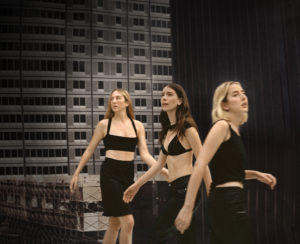
The idea of just being like, “We just did this. Let’s put it out” is kind of the vibe of the album. And I think in doing that we really kind of touched on something cool, and something that we hadn’t really sounded like before. Does that make sense?
MC: Absolutely. That’s why I say this is your Exile on Main St. The Stones established their sound and their hits on the early records, but on Exile they really got into a very authentic, loose, amazing groove.
Danielle: That was a lesson for us, because when we were coming out with our first album, it was such a big deal to us that we were making even our first album on a label, we really used a microscope, and we went in there and made sure that everything, to our ears, was exactly the way we wanted it, just because it meant so much to us, and we had been working so hard, and we really wanted to make sure what we were putting out there represented. But on this album, I think for sure, we let our Haim hair down.
MC: The title of the record itself suggests that you’ve been dealing with a lot of heavy things in the industry. But the record is even more raw, personal, emotional and moving at times, especially on songs like “Hallelujah” [an almost Dixie Chicks-esqe folk-country song]. Would you say there was a collective catharsis going on?
Danielle: I think during our second album there were a lot of trials and tribulations just having to do with us being burnt out of stuff within the business that we’ve been open about. Just being a woman in music can get difficult. Thank god we have each other, because I don’t know what it would be like to be a solo artist, because it can get really hard trying to understand the business side of things.
Este: Navigating the business in general is a constant battle, full of forks in the road, and self-doubt. All the things that go along with being an artist. I think a lot of the songs were definitely cathartic to write. We all decided that therapy was integral to our well-being, so we started unpacking everything that was happening in our lives. There were so many magical things that we have and that we‘re so blessed and so thankful for, but we talked about how post-tour depression is a real thing.
After our second record and touring our second record, I think at first all three of us were going through it separately, silently. I didn’t want to bother Danielle and Alana with this. Danielle didn’t want to bother me or Alana with it, but at some point, all three of us were like, “Are we okay? Like, what’s going on?” And I think that kind of opened the floodgates. We got our journals out and our diaries and we recognized that all three of us were going through different levels of depression. Once the floodgates were open it was kind of like we were off to the races.
The best part about music, for me at least, I always look at music as the thing that makes you feel less alone. And that you’re not on an island by yourself looking around like “I’m the only person who feels this way.” And so that’s part of what we were doing. Because we were feeling so isolated and alone in our feelings, we wanted to make something that didn’t make people feel so alone. The way that we try to craft lyrics is to be really truthful and honest and open, because we don’t know how to write any other way, And I think that also comes from listening to a healthy heaping of Joni Mitchell as kids.
MC: “Man from the Magazine” is so Joni Mitchell. You wear your influences on your sleeves, but does it get annoying when people project all these classic artists names on you?
Danielle: No! If anything, it’s intimidating. We’re talking about fucking Joni Mitchell, man, and I bow at the temple of Joni Mitchell. To me she is the rubric for songwriting. To hear our band’s name and her in the same sentence feels surreal, I’ll be completely honest. Because we’re still students. I still go back and listen to Blue at least once a week.
Este: Especially with Joni, it’s humbling to hear, that people reference such incredible, amazing musicians with us? Because we’re still three girls from the Valley sitting in front of our stereo listening to K-EARTH 101, KIIS FM. That we’re getting comparisons to those people, who we look up to still to this day, is so surreal that the 14-year-old Este Haim is truly not well when they say things like that!
MC: Do you think that when a legend like Stevie Nicks anoints you it’s because she feels the rare authenticity in your vintage vibes?
Este: Back in the day 101.3 was the college rock station at the time, and we would just put each song under a microscope and really try to understand what made them work and made them special. “What was the mixing like on this?” I remember the first time we really listened to “Bohemian Rhapsody” on headphones as kids, because it was on the Wayne’s World soundtrack. And even as a 5-year-old, recognizing that there was panning going on, I was like, “that’s really cool!” There are different ways to make the person experience the music.
Danielle: We’re just such music fans. At the heart of it, we’re just music fans and we love all types of music. We’re just students of Stevie Nicks. She was our teacher when we would just sit around and listen to her music and study it and learn it. And we had a family band with our parents, so it’s just where we come from and who we are.
MC: You still demo in GarageBand?
Danielle: GarageBand was the best tool for us as songwriters. The fact that you can make something all day in the program and then listen to it in your car right after is still mind blowing to us. We write to drums mostly, so it’s such a great tool. I think we start with drums really, we start to formulate what our sonic landscape is going to be when we think about drums, because our dad’s a drummer.
MC: Where are you laying down the tracks these days?
Danielle: Vox Studio is where we did a lot of basic tracking. What’s cool about that studio is that it’s filled with vintage gear and it’s my favorite-sounding room. All linoleum, no warm wood in sight. Not ‘70s sounding, but very live sounding. I think it was built in the ‘40s for jazz sessions. It’s very special and we got some great roomy drums sounds.
MC: The first album was mostly you three and a couple of bandmates/collaborators, but since then you have assembled your own Wrecking Crew of sorts.
Alana: We’re very lucky to be friends with some of the best musicians who are truly unique. Cass McCombs plays guitar like no one else, so it was really an honor for him to play on “The Steps.”
MC: You’ve been headlining for years now, but what are some lessons you learned as an opening act that you can pass on to bands opening for you?
Danielle: We’ve opened for everyone [laughs]. We still have opener mentality. We always just play loud and rough and play up to the crowd as much as we can, as if we’re the opener trying to get attention from the guy ordering drinks at the bar in the back. I think that’s why we’re so aggressive on stage. It was the best experience for us. It especially got us ready for festivals.
MC: Danielle might be the lead vocalist, but your band is unique in the way you trade vocals, almost finishing each other’s sentences within the song. Is that a “sister thing?”
Este: Not only in song, but in real life. There’s this weird sister telepathy that we possess. I can see with my eyes, I can feel it, when Danielle or Alana are uncomfortable or they’re feeling like they’re embarrassed or whatever. Maybe it’s the older sister in me, but I know when to swoop in and when not to swoop in to help.
MC: Can you tell us how the band’s been dealing with COVID?
Alana: I think we just try not to get overwhelmed! We’re taking it day by day.
MC: There was the “Deli Tour” [that included an appearance at Canter’s Delicatessen] that was interrupted by the pandemic, but there’s been other ways that you interacted with your fans through social media, like cooking classes [they made potato latkes with their mom] and some other fun things, right?
Este: We really wanted to do the Deli Tour, to be out there with the people who like our music, to share it with them and experience it with them, because the dialectical relationship we have with our audience is really magical. Feeding off an audience and giving energy and receiving energy is the main reason why we really love performing live.
The Deli Tour is going to happen once everything is safe, because the two dates that we got to do were so much fun. But once COVID hit and everyone went into quarantine we kind of had to get creative, and we would do these Zoom dance classes. And when we had the seven-year anniversary of Days Are Gone, I heard through the grapevine that there was going to be a group listening, like a bunch of fans had gotten together, and I still have the outfit that I wore on the cover, so I found the Zoom link and I jumped on. Which was really fun and really cool.
MC: Danielle, tell us about your YouTube guitar tutorial for your song, “FUBT.”
Danielle: It was important to me, you know? I was like “what’s the easiest way for everyone to do this? So I put up a GarageBand sound, cuz I feel like most people can have GarageBand on their computer or their iPad, and they can plug their guitars and have a pretty good-sounding amp. It was fun to show people the “Fucked Up But True” guitar solo. I really wanted to show and encourage people to pick up their guitars and learn it, because it’s not that difficult but there’s some cool things like sustain and vibrato and stuff that I feel really adds to the solo. I was like, “Hey, show me if you guys know it,” and I got hundreds of messages back with a lot of girls showing how they did it, which was so insane to me! We’re still figuring out how to really utilize social media. I need to get into the TikTok thing more.
MC: Este, congrats on the Fender campaign. Can you talk about that?
Este: I have always been a Fender girl; my first bass was a Fender Precision that my dad found in the Recycler for like 80 bucks. I was super-appreciative that he got it for me, and I’ve been a Fender fan ever since. I mean, I’ve gone off the beaten path when I got into [The Band’s] Rick Danko, but I realized that I would have to learn how to play with a pick and that wasn’t really my journey, so I went back to playing my Precision. I feel really lucky that they wanted me to be to be a part of it, and again, if you would have told this 16-year-old that that she would be in a Fender campaign she would have burst into tears. I knew how much I loved playing bass and how much fun it was and how much joy that that it brought me, but to be recognized by the company of the instrument that I’ve been playing for so long is overwhelming, truly. And so yeah, to be a part of it was unreal. I don’t even think it hit me until they interviewed me.
MC: You’ve expressed frustration at not being played by rock radio stations. “Forever” [from Haim’s debut] was a pop radio hit. Are you too eclectic for them? What do you think it is?
Danielle: We don’t know why rock radio won’t play us! But we don’t care anymore. They should play more women, though.
MC: That said, I still hear you every time I go to Ralph’s supermarket, or places like Marshall’s. It’s like you’re ubiquitous on the streaming services. How does it feel when you hear your music coming from the overhead speakers of a store?
Alana: Marshall’s is where we grew up. Still love it. It’s totally crazy when we hear our music out in the wild!
MC: Haim has appeared on several soundtracks now, the most recent being The Croods: A New Age. As eclectic as you are, it was still surprising to hear you go into “Welcome to the Jungle” territory.
Danielle: It’s so fun. It was pitched to us like “Hey do you want to work with Mark Mothersbaugh on this song, and we were like, no brainer. I still watch [Devo’s] SNL performance probably once a week. Talk about a band that changed the course of music. I’m like fully obsessed with Devo. You know, they wanted something like Guns N’ Roses and we never thought about doing something like that, but instead of being like “That’s not our thing,” I think we just kind of went fully into it. We were just like, “You know what? We’ve never done that and it could be fun.” Croods is such a fun movie and Ariel [Rechsthaid] helped produce it and he’s the biggest Guns N’ Roses fan. And it all came together pretty quickly.
MC: COVID aside, what’s your take on the state of rock bands in this industry in 2020?
Danielle: We feel so fortunate and we feel so lucky that we even get to do this, because we know how fucking crazy and difficult it is to navigate. I remember in 2012 everyone was like “Band’s don’t exist. Rock music’s dead.” I mean that was kind of the thing that we got the most back then. NME loved saying “ROCK IS BACK NOW WITH HAIM,” but how many “ROCK IS BACK” issues did they put out without it actually being real? I feel like EDM was at its height and people didn’t understand where guitars fit in the music industry.
What’s really cool about right now is that we’re seeing a lot of girls with guitars, we’re seeing a lot of guitars in bands, we’re hearing more live instruments, I think. That’s really cool for us. We love to see it and we love to be a part of that community. I think that’s what’s really exciting about this time.
Este: I echo everything Danielle is saying. That’s definitely been nice to hear. When we were playing shows before COVID, it made me really happy to meet people who said, “Man, I just started playing guitar,” “I just started playing bass,” or “You know, I’m learning how to record live instruments.” I think that really made us happy. And it still makes me happy.
Photos by Reto Schmid
Contact Benny Tarantini, BT PR, Benny@btpr.biz, 646-405-7010

